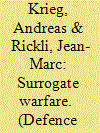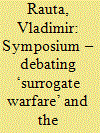| Srl | Item |
| 1 |
ID:
159186


|
|
|
|
|
| Summary/Abstract |
Airpower, drones and cyber-weapons are employed by states in conjunction with local armed non-state actors in an effort to coercively intervene in the crises of the twenty-first century. While the externalization of the burden of warfare is a return to pre-modern war, it is the change in the underlying socio-political relations between the state and its military agent that is a novel phenomenon in surrogate warfare. This article demonstrates that in a post-Westphalian era characterized by non-state violence, globalized conflicts, a prioritization of risk management in a mediatized environment, the state has to explore new ways to remain relevant as the primary communal security provider. Thereby, the organization of violence has departed from the employment of the state’s soldier as the primary bearer of the burden of warfare to a mode of war where technological and human surrogates enable the state to manage the risks of post-modern conflict remotely. In this article, we conceptually explore surrogate warfare as a socio-political phenomenon within the context of globalized, privatized, securitized and mediatized war.
|
|
|
|
|
|
|
|
|
|
|
|
|
|
|
|
| 2 |
ID:
170251


|
|
|
|
|
| Summary/Abstract |
In two separate addresses to the United Nations General Assembly, former United States (U.S.) President, Barack Obama, linked the religious wars of the Middle East to the dangers of proxy wars. In September 2014, he acknowledged the long history of religiously motivated wars, and invited the international community to take note of “the destruction wrought by proxy wars and terror campaigns between Sunni and Shia across the Middle East” (Roberts 2014). Two years later, Obama reiterated his earlier concerns warning that “across the region’s conflicts, we have to insist that all parties recognize a common humanity and that nations end proxy wars that fuel disorder” (Oakford and Salisbury 2016).
|
|
|
|
|
|
|
|
|
|
|
|
|
|
|
|